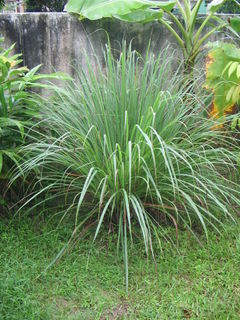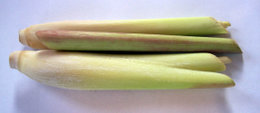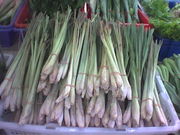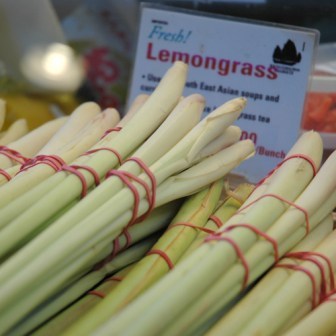Cymbopogon
2008/9 Schools Wikipedia Selection. Related subjects: Agriculture; Plants
| Lemon Grass | ||||||||||||
|---|---|---|---|---|---|---|---|---|---|---|---|---|
 Lemon grass plant
|
||||||||||||
| Scientific classification | ||||||||||||
|
||||||||||||
| Species | ||||||||||||
|
About 55, see text |
Cymbopogon is a genus of about 55 species of grasses, native to warm temperate and tropical regions of the Old World and Oceania. It is a tall perennial grass. Common names include lemon grass, lemongrass, barbed wire grass, silky heads, citronella grass, fever grass or Hierba Luisa amongst many others.
Cultivation and uses
Lemon grass is widely used as an herb in Asian (particularly Vietnamese, Hmong, Khmer, Thai, Lao, Malaysian, Indonesian, Philippine, Sri Lankan) and Caribbean cooking. It has a citrus flavour and can be dried and powdered, or used fresh. The stalk itself is too hard to be eaten except for the soft inner part. However, it can be finely sliced and added to recipes. It may also be bruised and added whole as this releases the aromatic oils from the juice sacs in the stalk. The main constituent of lemongrass oil is citral, which makes up around 80% of the total.
Lemon grass is commonly used in teas, soups, and curries. It is also suitable for poultry, fish, and seafood. It is often used as a tea in African and Latino-American countries (e.g. Togo, Mexico, DR Congo).
East-Indian Lemon Grass (Cymbopogon flexuosus), also called Cochin Grass or Malabar Grass, is native to Cambodia, India, Sri Lanka, Burma,and Thailand while the West-Indian lemon grass (Cymbopogon citratus), also known as serai in Malay, is assumed to have its origins in Malaysia. While both can be used interchangeably, C. citratus is more suited for cooking. In India C. citratus is used both as a medical herb and in perfumes.
Research also shows that lemon grass oil has antifungal properties.
Citronella Grass ( Cymbopogon nardus and Cymbopogon winterianus) is similar to the species above but grows to 2 m and has red base stems. These species are used for the production of citronella oil, which is used in soaps, as a mosquito repellent in insect sprays and candles, and also in aromatherapy, which is famous in Bintan, Indonesia. The principal chemical constituents of citronella, geraniol and citronellol, are antiseptics, hence their use in household disinfectants and soaps. Besides oil production, citronella grass is also used for culinary purposes, in tea and as a flavoring.
Palmarosa ( Cymbopogon martinii), also called Rosha Grass and Indian Geranium, is another species used in the perfume industry. It is a perennial clumping grass which grows to 150 cm with finer leaves and has a smaller bulbous base than the species above. The leaves and flower tops contain a sweet smelling oil which is used for the production of geraniol. It is also distilled into palmarosa oil and used in aromatherapy for its calming effect to help relieve nervous tension and stress.
Lemongrass in some cases has been used as a mild depressant for the central nervous system. It is also sometimes used as a weed barrier.
One particular alpine grassland variant known as juzai is a staple of Kyrgyz, Dungan and Uyghur cooking.
In the Philippines
Abundant in the Philippines, and 65- to 85-% citral, Cymbopogon citratus contains active ingredients like myrcene, an antibacterial and pain reliever, citronella, citronellol and geranilol. NGO Alternative Indigenous Development Foundation Inc. (Adfi) established in Mambugsay, South of Negros and Escalante, Negros Occidental lemon grass essential oil production, via distillery plants which extract the oil. Hydro steam distillation, condensation and cooling were used to separate the oil from the water. Hydrosol or Hydrolat, as a by-product of the distillation process, is a pure natural water or plant water essence used for the production of skin care products such as lotions, creams and facial cleansing toner in its pure form. The main products are - organic unadulterated lemon grass oil (for industrial users), and “Negros Oil” (mixture of lemon grass oil with virgin coconut oil) used in aromatherapy.
Partial species list
- Cymbopogon ambiguus Australian lemon-scented grass (native of Australia)
- Cymbopogon bombycinus Silky Oilgrass (native of Australia)
- Cymbopogon citratus Lemon Grass
- Cymbopogon citriodora West Indian lemon grass
- Cymbopogon flexuosus East Indian lemon grass
- Cymbopogon martinii Palmarosa
- Cymbopogon nardus Citronella Grass
- Cymbopogon obtectus Silky-heads (native of Australia)
- Cymbopogon procerus (native of Australia)
- Cymbopogon proximus found in Egypt
- Cymbopogon refractus Barbed wire grass (native of Australia)
- Cymbopogon winterianus Citronella Grass


